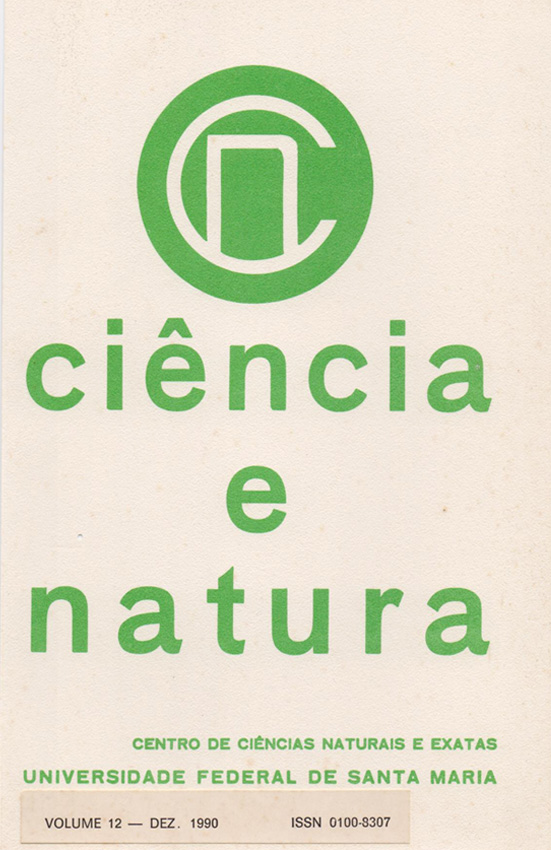One non-traditional strategy the the teaching of mathematics for the third grade
DOI:
https://doi.org/10.5902/2179460X25478Abstract
In this paper. we report a teaching experience which has been done in Mathematics Institute of Universidade Federal do Rio de Janeiro since 1983 by a group of teachers.
This activity has been presented as an extra-course of Scientific Initiation and its main purpose is to develop the Scientific though and the searching vocation of the undergraduated students.
In this Project, mathematical models have been used by teachers and students as a way of acquiring or improving their learning while they rediscover by themselves all the steps on the creative process that lead to scientific development.
This scheme is important because it valorizes two aspects of education - the informative and the formative one-changing the focal point of the educational process from the teacher to the students.
Downloads
References
BENDER, Edward A. - An Introduction to Mathematical Modeling John Wiley and Sons, Inc., 1978.
BARRETO, A.C. - Teaching as Based on Interdisciplinary Mathematical Models - Proceeding of the Fourth Intercontinental Congress of Mathematical Education.
BARRETO, A.C. - Mathematical Education Based on Interdisciplinary Mathematical Models - A Viable strategy for the Third World - Fifth International Congress of Mathematical Education.
BURGHES, D.N. e HUNTLEY, I. - Teaching Mathematical Modelling – refleetions and advice - Int. Math. Educ. Sci. Technol, 1982 vol 13, nº 6, 735-754.
FlAVELL, H. John - A Psicologia do Desenvolvimento de Jean Piaget - livraria Pioneira, Editora - São Paulo, 1975.
HABERMAN, C. - Mathematical Models - Prentice Hall - 1977.
Downloads
Published
How to Cite
Issue
Section
License
To access the DECLARATION AND TRANSFER OF COPYRIGHT AUTHOR’S DECLARATION AND COPYRIGHT LICENSE click here.
Ethical Guidelines for Journal Publication
The Ciência e Natura journal is committed to ensuring ethics in publication and quality of articles.
Conformance to standards of ethical behavior is therefore expected of all parties involved: Authors, Editors, Reviewers, and the Publisher.
In particular,
Authors: Authors should present an objective discussion of the significance of research work as well as sufficient detail and references to permit others to replicate the experiments. Fraudulent or knowingly inaccurate statements constitute unethical behavior and are unacceptable. Review Articles should also be objective, comprehensive, and accurate accounts of the state of the art. The Authors should ensure that their work is entirely original works, and if the work and/or words of others have been used, this has been appropriately acknowledged. Plagiarism in all its forms constitutes unethical publishing behavior and is unacceptable. Submitting the same manuscript to more than one journal concurrently constitutes unethical publishing behavior and is unacceptable. Authors should not submit articles describing essentially the same research to more than one journal. The corresponding Author should ensure that there is a full consensus of all Co-authors in approving the final version of the paper and its submission for publication.
Editors: Editors should evaluate manuscripts exclusively on the basis of their academic merit. An Editor must not use unpublished information in the editor's own research without the express written consent of the Author. Editors should take reasonable responsive measures when ethical complaints have been presented concerning a submitted manuscript or published paper.
Reviewers: Any manuscripts received for review must be treated as confidential documents. Privileged information or ideas obtained through peer review must be kept confidential and not used for personal advantage. Reviewers should be conducted objectively, and observations should be formulated clearly with supporting arguments, so that Authors can use them for improving the paper. Any selected Reviewer who feels unqualified to review the research reported in a manuscript or knows that its prompt review will be impossible should notify the Editor and excuse himself from the review process. Reviewers should not consider manuscripts in which they have conflicts of interest resulting from competitive, collaborative, or other relationships or connections with any of the authors, companies, or institutions connected to the papers.







